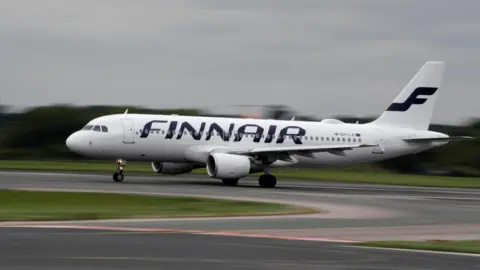Russia blamed for GPS interference affecting flights in Europe
 Reuters
ReutersRussia is causing disruption to satellite navigation systems affecting thousands of civilian flights, experts say.
The Baltic Sea, the Black Sea and the eastern Mediterranean - the regions where Russia's military has been most active - have seen an increase in disruption to the Global Positioning System (GPS).
This has left aircraft unable to receive GPS signals.
In March, a RAF plane carrying Defence Secretary Grant Shapps had its GPS signal jammed while flying close to Russian territory.
The persistent disruption led Finland's flag carrier Finnair to suspend daily flights to Estonia's second largest city, Tartu, for a month, after two of its aircraft had to return to Helsinki due to GPS interference.
Tartu Airport relies solely on GPS, unlike most larger airports which have alternative navigation systems that allow aircraft to land even if the signal is lost.
Juho Sinkkonen, Finnair's vice-president for flight operations, told the BBC their aircraft encounter this issue daily.
“Pilots are reporting cases actively, and we get more than 100 reports per month,” he said.
However, Mr Sinkkonen said GPS interference is mainly a nuisance and carries few risks.
This is because while an aircraft is in flight - i.e. before approaching and landing at an airport – it can normally use other navigation systems, so losing connection to GPS does not pose an immediate threat to its safety.
According to Cyrille Rosay, a senior cybersecurity expert at the European Union Aviation Safety Agency (EASA), while the problem existed before the Russian invasion of Ukraine in February 2022 it is worsening.
The EASA now clocks "several thousand incidents" per year, Mr Rosay said.
 UK MOD © Crown copyright 2024
UK MOD © Crown copyright 2024When asked where the blame lies, officials from the Baltic states don’t hesitate.
"The source of interference is Russia,” Estonia's Foreign Minister Margus Tsahkna told the BBC.
“We have proof that it is coming from Russia, and Russia is violating all the international agreements."
Mr Tsahkna said the sources of interference were located near the Russian cities of St Petersburg, Kaliningrad and Pskov.
Online investigators agree, saying GPS jammers are likely located halfway between St Petersburg and Estonia and near the Russian enclave of Kaliningrad on the Baltic Sea – where the RAF plane carrying Defence Secretary Grant Shapps was when its signal was jammed.
Mr Tsahkna said that by jamming GPS signals, Russia was “violating our territories” and putting people and civilian airplanes in danger.
“This is a violation of international agreements… And also I'm really sure that they know exactly what they're doing," he added.
The BBC has contacted Russia's Ministry of Defence for comment.
There have also been reports of maritime traffic in the Baltic Sea being affected by GPS interference.
Jamming is the most widespread form of such meddling, but there have also been numerous instances of "spoofing", when legitimate signals are replaced with fake ones, indicating a false location.
Keir Giles, director of the Conflict Studies Research Centre, a British think tank, believes Russia is meddling with GPS for both offensive and defensive reasons.
He says that while on the one hand Russia is testing "its capabilities for immobilizing Europe completely in time of crisis", it is also trying to protect itself from possible missile and drone attacks.
"Ukraine has already found ways around Russia's GPS jamming, using other navigational systems to carry out drone strikes deep into Russia. But of course that doesn't mean that Russia doesn't benefit from making sure that GPS simply does not work," Mr Giles told the BBC.
The impact of GPS interference on Russia's own navigation is much less severe as it has its own sat-nav system, called GLONASS.
Aircraft may have backup systems to work around GPS jamming, but Dana Goward, president of the US-based Resilient Navigation and Timing Foundation, which protects and improves GPS communication, says that meddling with signals still poses serious risks because "all of our systems and society has been structured around precise GPS signals".
“When we take the GPS out, clearly to some degree the efficiency and the safety of the aviation system is going to go down,” he added.
“People have to revert to old procedures that they're not quite so familiar with. There is going to be some harm, and we just hope it all stops before something bad happens.”
